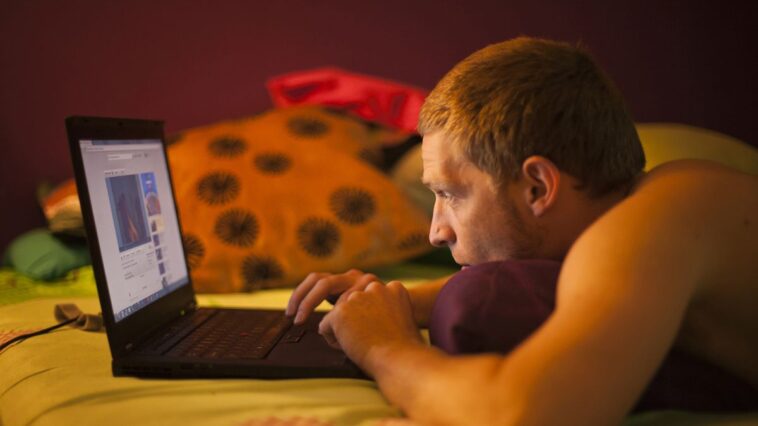In the landscape of modern society, the consumption of pornography has become an almost ubiquitous facet of human sexuality. It’s an activity that many individuals engage in, yet it is often shrouded in a veil of secrecy, shame, and guilt.
These powerful emotions can cast a shadow over an otherwise natural and common aspect of adult life. The question arises: Why does an activity so prevalent carry with it such profound negativity for so many? The answer lies in the complex interplay of societal norms, personal beliefs, and deeply ingrained moral values.
This article embarks on a journey to unravel the intricacies of guilt and shame intertwined with pornography consumption, with the ultimate goal of shedding light on these emotions, promoting understanding, and guiding readers toward a path of self-acceptance.
Understanding Guilt and Shame

To navigate the landscape of guilt and shame in the context of pornography consumption, it is imperative to first distinguish between these two distinct yet closely related emotions. Guilt typically manifests when individuals feel that they have committed specific wrongdoing, thereby acknowledging a sense of responsibility for their actions.
In the realm of pornography, this emotion might be expressed as, “I shouldn’t be watching this; it goes against my values and beliefs.” It often signifies an awareness of a deviation from one’s personal moral compass.
In contrast, shame is a far more profound and pervasive emotion. It transcends specific actions and delves deep into one’s self-identity. When shame emerges in the context of pornography consumption, it whispers insidiously, “I am a bad person for indulging in this.”
Unlike guilt, shame implies that there is something inherently flawed or wicked about the individual as a whole, not just in their actions. It engenders feelings of unworthiness, self-loathing, and a belief that one is fundamentally flawed. Recognizing this critical distinction between guilt and shame is a pivotal step toward effectively addressing and processing these complex emotions.
Society’s Impact on Perceptions
From historical puritanical beliefs to modern cultural standards, societal norms significantly influence our perceptions of porn. This foundation often plants seeds of stigmatization.
Stereotypes suggest that consuming porn is “dirty” or “immoral,” perpetuating feelings of guilt and shame. These societal constructs act as barriers, preventing individuals from openly discussing their experiences and emotions tied to porn.
The Reality of Porn Consumption

Contrary to the stifling silence surrounding the topic, studies show that a substantial majority of adults, across genders and sexual orientations, have engaged with porn and free cam sites at some point.
It’s crucial to acknowledge that porn consumption is a natural, human behavior, with many using it as a tool for exploration, relaxation, or pleasure. Understanding its commonality can be the first step towards mitigating feelings of guilt.
Factors Contributing to Guilt
There’s no one-size-fits-all answer as to why individuals feel guilty about porn. Factors range from religious teachings that categorize it as a sin, to societal expectations around purity and modesty, cultural background influences, and even the intricate dynamics of personal relationships.
It’s not just about watching it; it’s about how it aligns or clashes with personal values and societal standards. Recognizing these triggers is crucial, not just to relieve guilt momentarily but to understand and address the root cause, ensuring a healthier mental and emotional state in the long run.
Recognizing Healthy Consumption

Like any form of media, there’s a spectrum when it comes to porn. This spectrum ranges from ethically produced content that prioritizes and emphasizes consent, representation, and diversity to more problematic portrayals that might reinforce stereotypes or lack consent.
Responsible consumption isn’t just about moderation; it’s about being discerning, setting personal boundaries, and choosing sources that reflect one’s values and ethical standpoints. In a digital age brimming with content, prioritizing consent and accurate representation becomes crucial for ensuring a healthier, more informed interaction with the medium.
Breaking Down Stigmas
Transforming collective perceptions about porn is an essential journey. It’s vital to challenge stigmas head-on, to uproot long-standing prejudices that shroud the topic in negativity. Encouraging open dialogues—whether in educational institutions like classrooms, within the sanctity of homes, or therapeutic environments like therapy sessions—can systematically destigmatize porn consumption.
Such initiatives can light the path for individuals to process their feelings without the looming, oppressive shadow of societal judgment, fostering a more understanding and accepting society.
Self-Reflection and Self-Acceptance

In the whirlwind of external voices and societal pressure, introspection becomes our guiding compass. It’s essential to pause, reflect, and evaluate our relationship with porn without judgment. This means understanding what drives consumption, what feelings it evokes, and how it aligns with one’s self-image.
By comprehending our feelings and underlying motivations, we embark on a path that leads towards embracing our sexuality and choices with openness, leading to profound self-acceptance and internal peace.
Communication in Relationships
Open communication isn’t just a desirable trait; it’s the cornerstone of flourishing, healthy relationships. Discussing topics considered taboo, like porn consumption, paves the way for deeper connection and understanding.
Engaging with partners, setting mutually agreed-upon boundaries, and navigating preferences ensures that every aspect of the relationship is built on trust and respect. When both parties feel heard, respected, and understood, it solidifies the foundation and enhances intimacy.
Seeking Support and Counseling

Emotions, especially when tied to topics as sensitive as porn, can sometimes escalate, becoming overwhelming and isolating. In these moments, external support becomes invaluable. Seeking therapy or joining support groups tailored to address these feelings can be immensely beneficial.
These spaces, led by professionals or empathetic peers, offer valuable insights, coping strategies, and a supportive environment. Here, individuals aren’t alone, enabling them to navigate their intricate feelings with understanding and care.
Empowering Others
Our personal narratives, with their vulnerabilities and triumphs, carry immense power. Sharing personal stories and experiences around porn, guilt, and acceptance can be both cathartic for the speaker and empowering for the listener. These open discussions act as bridges, breaking down barriers and prejudices.
They nurture a sense of community, unity, and belonging. Support networks, whether found in offline group meetings or thriving online communities, offer sanctuary and safe spaces, ensuring individuals grappling with complex feelings find understanding and kinship.
Conclusion: Embracing a Guilt-Free Perspective

Navigating guilt around porn consumption is a journey—one that requires self-reflection, open communication, and, most importantly, self-acceptance. As we break down societal stigmas, we pave the way for a healthier, more inclusive perspective on porn.



